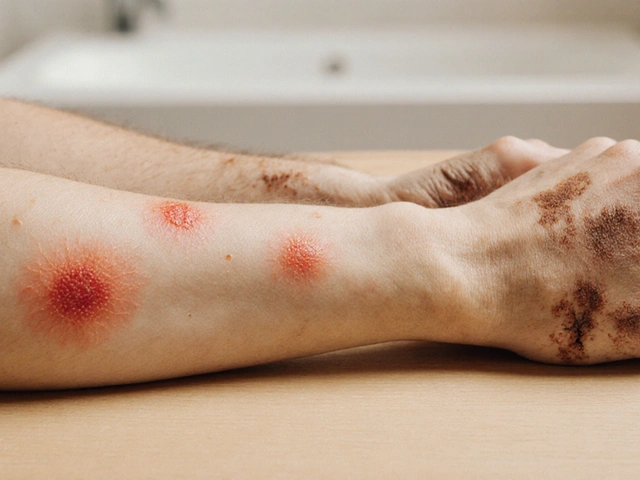Understanding Dermatitis Herpetiformis
Before we delve into the connection between dermatitis herpetiformis and sleep, it's essential to understand what this condition is. Dermatitis herpetiformis, often referred to as DH, is a chronic skin condition that manifests as blistering skin lesions. It's often linked to celiac disease, a condition that affects your small intestines when you eat gluten. The itching and blistering symptoms of DH can be very intense, and without proper management, they can significantly disrupt your sleep.
The Connection Between Dermatitis Herpetiformis and Sleep
Having a good night's sleep with DH can be challenging. The itching and burning sensations associated with DH can make it difficult for you to fall asleep or stay asleep throughout the night. Even more, the discomfort can cause frequent wake-ups, leading to fragmented and poor-quality sleep. But don't worry, as disruptive as this condition can be, there are ways to manage it and ensure you get a good night's rest.
Creating a Bedtime Routine
Establishing a consistent bedtime routine can help set your body's internal clock, making it easier for you to fall asleep and stay asleep. This routine could include activities that help you wind down, like reading a book, meditating, or taking a warm bath. It's also essential to go to bed and wake up at the same time every day, even on weekends. This consistency can significantly improve your sleep quality.
Managing Itching and Discomfort
One of the main reasons people with DH struggle with sleep is due to the itching and discomfort. Therefore, finding effective ways to manage these symptoms is crucial. Over-the-counter creams and ointments that contain dapsone can help reduce itching and inflammation. Additionally, a cold compress applied to itchy areas can provide temporary relief. Remember to keep your nails short to prevent damage from scratching.
Maintaining a Gluten-Free Diet
Since DH is closely related to celiac disease, maintaining a strict gluten-free diet can significantly reduce symptoms and improve your sleep. Avoid foods and drinks containing wheat, barley, and rye. Opt for naturally gluten-free grains like rice, quinoa, and oats (but ensure they are labelled gluten-free to avoid cross-contamination). A dietitian can provide valuable guidance in managing a gluten-free diet.
Creating a Comfortable Sleep Environment
Your sleep environment plays a significant role in the quality of your sleep. Ensure your room is dark, quiet, and cool. Consider using earplugs or a white noise machine to block out disruptive sounds. Invest in a comfortable mattress, pillows, and bedding. Using hypoallergenic beddings can also reduce potential allergens that could worsen your DH symptoms.
Seeking Professional Help
If your DH symptoms continue to disrupt your sleep despite your best efforts, it may be time to seek professional help. A dermatologist can provide treatments such as prescription medications to control your symptoms. Additionally, a sleep specialist can help identify any underlying sleep disorders and provide appropriate treatments. Never underestimate the importance of good sleep for your overall health and wellbeing.






This is actually super helpful. I've been struggling with sleep since my DH diagnosis and the gluten-free tip changed everything for me. No more 3am itching marathons.
Just stick to the plan and your body will thank you.
One must question the scientific validity of conflating dermatitis herpetiformis with celiac disease, as the epidemiological data remains statistically inconclusive. Moreover, the assertion that a gluten-free diet confers therapeutic benefit is not universally supported by double-blind, peer-reviewed trials. One must exercise epistemological caution before adopting dietary dogma.
Gluten-free? Please. The real issue is the glyphosate in your oatmeal. The FDA’s been covering this up since ‘98. Your ‘itching’? That’s your liver screaming from Roundup residue. Go read Dr. Hargrove’s 2014 white paper on transgenic cereals and neurocutaneous inflammation. They don’t want you to know this.
So you’re telling me the solution to not being able to sleep is… to sleep more? Groundbreaking. Next you’ll tell me water is wet.
You people are so naive. You think a diet change fixes everything? Nah. You’re just being lazy. If you actually cared about your health, you’d be doing cold plunges at 5am and fasting for 20 hours. But no, you’d rather whine about itching and buy organic quinoa. Pathetic.
I just wanted to say thank you for writing this. I’ve had DH for 8 years and this is the first time someone actually explained sleep hygiene without making me feel broken. 💙
Dapsone cream works but it’s pricey. Try applying aloe vera gel + cold chamomile tea compress before bed. Also, sleep in 100% cotton pajamas - no synthetics. I’ve slept through the night for 2 years straight since switching. 🙌
OMG YES the cotton pajamas!! I was wearing bamboo ones thinking they were better but nooo they made it worse. Cotton = life. Also, keep a fan on low. Cool air = less itching. You got this!! 😊
I appreciate the practical advice here. I’ve tried everything from antihistamines to acupuncture. The gluten-free diet was the only thing that gave me consistent relief. It’s not easy, but it’s worth it.
You missed mentioning that DH is a psychosomatic manifestation of unresolved trauma. The skin is the body’s mirror. If you’re not in therapy, none of this matters. Also, your ‘hypoallergenic bedding’ is probably made with microplastics. You’re still poisoning yourself.
This article is a dangerous oversimplification of a complex autoimmune phenomenon! The government, Big Pharma, and the gluten-industrial complex are colluding to sell you $12 gluten-free bread so you’ll forget that the real cause is 5G radiation-induced histamine dysregulation! Wake up! Your mattress is probably laced with graphene oxide! Sleep? You’re not sleeping-you’re being monitored!